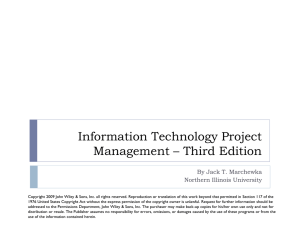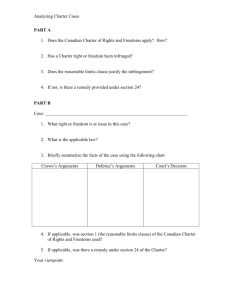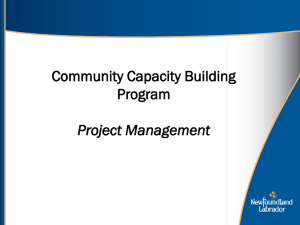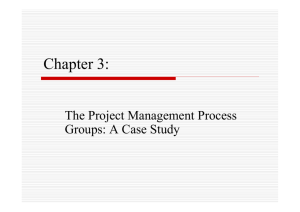Chapter 3: Developing the Project Charter & Baseline Plan
advertisement
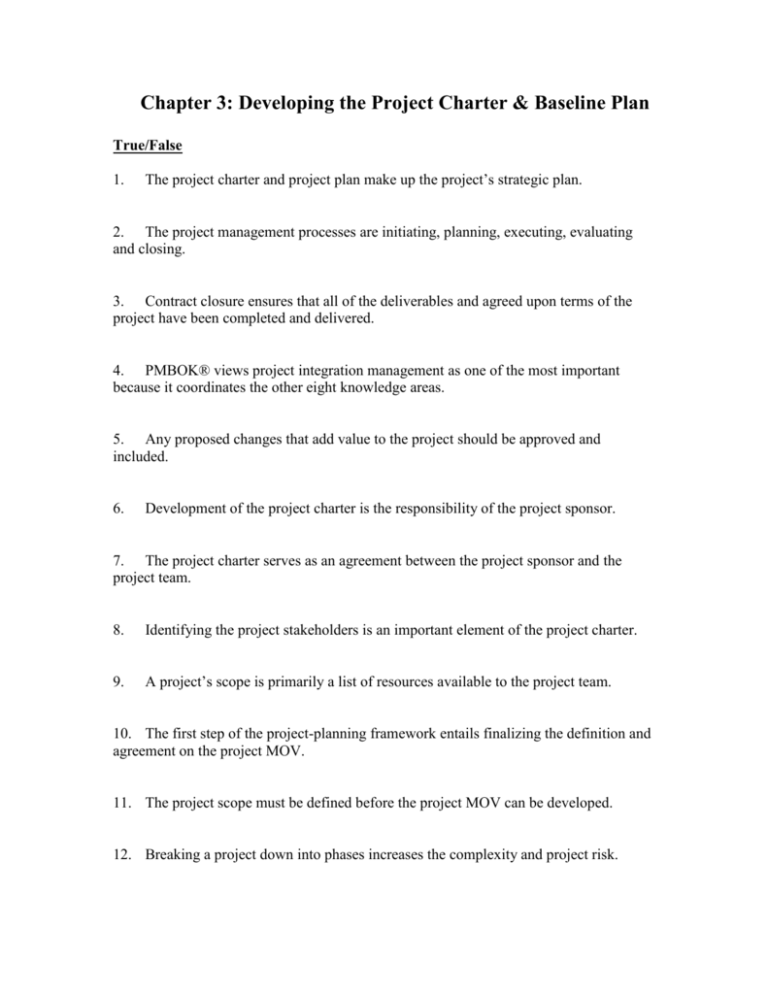
Chapter 3: Developing the Project Charter & Baseline Plan True/False 1. The project charter and project plan make up the project’s strategic plan. 2. The project management processes are initiating, planning, executing, evaluating and closing. 3. Contract closure ensures that all of the deliverables and agreed upon terms of the project have been completed and delivered. 4. PMBOK® views project integration management as one of the most important because it coordinates the other eight knowledge areas. 5. Any proposed changes that add value to the project should be approved and included. 6. Development of the project charter is the responsibility of the project sponsor. 7. The project charter serves as an agreement between the project sponsor and the project team. 8. Identifying the project stakeholders is an important element of the project charter. 9. A project’s scope is primarily a list of resources available to the project team. 10. The first step of the project-planning framework entails finalizing the definition and agreement on the project MOV. 11. The project scope must be defined before the project MOV can be developed. 12. Breaking a project down into phases increases the complexity and project risk. 13 The existence of parallel tasks will likely lengthen the project schedule. 14. A kick-off meeting is often held to develop the project plan. 15. Work done in parallel will usually result in a savings of time and budget. 16. Once the project plan is complete the project manager should review it and the project sponsor and project team should make sure it is able to achieve the project MOV. 17. The kick-off meeting brings closure to the planning phase of the project. 18. PMBOK® defines scope as the product or services to be provided by the project and includes all of the project deliverables. 19. Project administration focuses on the controls that will support the project. 20. In general, the project plan and project charter should be developed together. Multiple Choice 1. The project's charter and project plan represents: a) b) c) d) e) a review of the business case. a strategic plan. a tactical plan. a budgeting technique. none of the above Answer: 2. The project charter and project plan concentrates on which of the following PMBOK® areas?: a) b) c) d) e) Project Scope Management Project Time Management Project Communication Management Project Schedule Management Project Integration Management Answer: 3. The project management process are: a) b) c) d) e) Documenting, Defining, Summarizing, Selecting Planning, Analyzing, Executing, Testing, Maintaining Initiating, Planning, Defining, Verifying, Closing Opening, Estimating, Choosing, Executing, and Closing Initiating, Planning, Executing, Controlling, and Closing Answer: 4. All of the following are true concerning change controls except: a) Change controls must document stakeholders authorized to submit changes. b) Change controls must ensure that a process is in place to evaluate the value of a proposed change. c) Change controls must help the project manager manage change so that it does not disrupt the team. d) Change controls must include emergency procedures. e) Change controls must determine whether an accepted change has been implemented. Answer: 5. Initiating processes: a) b) c) d) e) signal the beginning of the project or phase. requires an organization to make a commitment of time and resources. are part of the project management processes and ITPM phases. all of the above none of the above Answer: 6. Things that must go right in order for the project plan to be completed are called: a) b) c) d) e) phases. constraints. assumptions. metrics. essentials. Answer: 7. The documenting and archiving of all project documents and evaluating the project in terms of MOV is the definition of: a) b) c) d) e) Contract closure Administrative closure End phase evaluation Project history Final phase management Answer: 8. The project charter: a) b) c) d) e) Answer: and the project plan should be developed together. and the project plan are the same document. and the project plan are developed in the scope document. is summarized in the project plan. is developed by the project sponsor. 9. A communication plan, a quality management plan and change management plan are all associated with which part of the project charter?: a) b) c) d) e) Project Resources Project Scope Project Description Project References Project Administration Answer: 10. Which of the following statements are true?: a) b) c) d) e) Answer: Milestones are logical units of work. Baseline plans are approved project plans. All tasks are linear, i.e. have to be completed in a particular sequence. The kick-off meeting typically begins the planning phase of a project. MOV are readily changed through change control processes. Short Answer (From End of Chapter Review Questions) 1. What are project management processes? Give one example. 2. What are product-oriented processes? Give one example. 3. Why must a balance exist between project management processes and productoriented processes? 4. Describe the initiating processes. Give one example of an initiating process to support a particular phase of the IT project methodology. 5. Describe the planning process. Give one example of a planning process to support a particular phase of the IT project methodology. 6. Describe the executing process. Give one example of an executing process to support a particular phase of the IT project methodology. 7. Describe the controlling process. Give one example of a controlling process to support a particular phase of the IT project methodology. 8. Describe the closing process. Give one example of a closing process to support a particular phase of the IT project methodology. 9. Describe how the output of project management process groups in one phase becomes the input or catalyst for the process group in the next phase. Provide an example. 10. What is the difference between contract closure and administrative closure? 11. Describe project integration management and its relationship to the other eight Project Management Body of Knowledge areas. 12. Describe project plan development and its importance to the second phase of the IT project methodology. 13. Describe project plan execution and its importance to project plan development. 14. Describe overall change control and its importance to the project team. 15. What is the purpose of a project charter? 16. Why can a project charter serve as an agreement or a contract? 17. Why is a project charter a useful communication tool? 18. Why should the project charter and project plan be developed together? 19. How does the project charter support the project plan? 20. How does the project plan support the project charter? 21. Describe the project-planning framework. 22. Why is it important that the project's MOV be cast in stone? 23. Describe how the project's MOV supports the development of the project's scope, schedule, and budget. 24. What is a project's scope? 25. Why should a project be divided into phases? 26. What is a deliverable? What is the relationship between phases and deliverables? 27. What is a milestone? Why are milestones useful? 28. What is a task? Provide three examples of some typical tasks in an IT project. 29. What impact can the sequence of tasks have on a project's schedule? 30. How can resources impact the schedule of a project? 31. What is a baseline plan? What purpose does it serve once the project team begins to execute the project plan? 32. What is a kick-off meeting? What purpose does it serve? Essay Questions 1. Using an example of each, describe and differentiate between project process and product processes. 2 List the five Project Management Process Groups and describe how they support the phases of the project life cycle. 3. What are constraints and assumptions and what role do they play in project integration management? 4. What are the goals and purposes of a project charter? 5. How should proposed changes in the project be handled and what are the relevant criteria for change decisions? 6. What is Project Scope and how should it be managed? 7. What are the potential benefits of a kickoff meeting? 8. Is the detailed identification of project stakeholders a relevant consideration of the project charter? If so, why? If not, why not? 9. What is the focus of project administration and what plans would be included in this segment of the project-planning framework? 10. What are phases and milestones and what do they contribute to the project’s organization?


